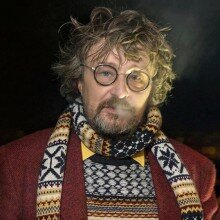
Aldo Nove (pseudonym of Antonello Centanin) was born in Viggiù (Varese), and he lives and works in Milan. After obtaining a master’s degree in ethics in 1995, he began to write novels and short stories, and later he dedicated himself to poetry. One of his short stories is translated in English and published (along with other European writers such as Arnon Grunberg) in the short story collection, Decapolis: Tales of ten cities. His first two collections of poetry were written under a pseudonym, but in 2007 he began publishing under his real name. Addio mio novecento (Goodbye my twentieth century), his fourth collection of poetry, appeared in 2014 and was awarded the Premio Cesare Pavese Prize.
In Addio mio novecento, a book described by critics as the summit of Aldo Nove’s maturity as a poet, the dominant theme is the classical farewell, but he writes a surprisingly intelligent and renewed version of his own personal farewell. Bianca Garavelli writes that this particular parting, like all other partings, reveals itself with difficulty. The final act of saying goodbye is in fact described again and again, and many different poems bear titles like the title of this poetry collection: Addio mio novecento.
Minor themes as space, time, sky and poetry occur in many titles and, although appearing irregularly, they produce a real leitmotiv. Garavelli states that when we think we truly have lost that to which we’ve said goodbye, we might just come across again the things or beloved ones we believed to have forever lost. In a kind of loop, we re-experience all the episodes of our lives, the objects, the smells, the flavours. And it’s no wonder, since ‘we have been crystals’ and still are, and ‘we are stones’, ‘we are intervals’, for all of the elements of the universe live inside us, and the memories of other human lives that preceded us as well. In her view, the return, more than the farewell theme, is at the heart of this book. The discovery that the forward flow of time is circular is crucial to the poet – and it is an emotional discovery.
Without a doubt, Aldo Nove deals with the end of memory, not just the end of a century but the end of our sense of the past, of a reassuring continuity. And with the end of memory, and the gradual disappearance of the past, nostalgia too becomes more and more feeble.
All is, therefore, a reflection on time. On one hand, there is personal and historical time; on the other, there is cosmic and geological time. There are poems which contain concrete memories of his childhood, and there are ones which merely reflect on time itself, they are preoccupations on the inevitable passing of time. The poet goes on further, as to imagine the memories of all human life that ever existed in the universe, in this constellation. Unambiguously he describes this in his poem ‘Time’:
flowing through all history
Like the memory of each and every one of us
The rest is a big Nothing
which contains it.
Bibliography
Poetry
Addio mio novecento. Einaudi, Turin, 2014; winner of the Premio Cesare Pavese
A schemi di costellazioni. Einaudi, Turin, 2010
Maria. Einaudi, Turin, 2007
Nelle galassie oggi come oggi. With Raul Montanari and Tiziano Scarpa. Einaudi, Turin, 2001
Prose
Tutta la luce del mondo. Il romanzo di San Francesco. Bompiani, Milan, 2014
La vita oscena. Einaudi, Turin, 2010
Puerto Plata Market. Einaudi, Turin, 2008
Superwoobinda. Einaudi, Turin, 2006
Mi chiamo Roberta, ho 40 anni, guadagno 250 anni al mese. Einaudi, Turin, 2006
La più grande balena morta della Lombardia. Einaudi, Turin, 2004
Links
Author page on the website of Einaudi (Italian)
Interview with minima&moralia (Italian)
Music video ‘Plastic people’ by RADAR, with lyrics by Aldo Nove

